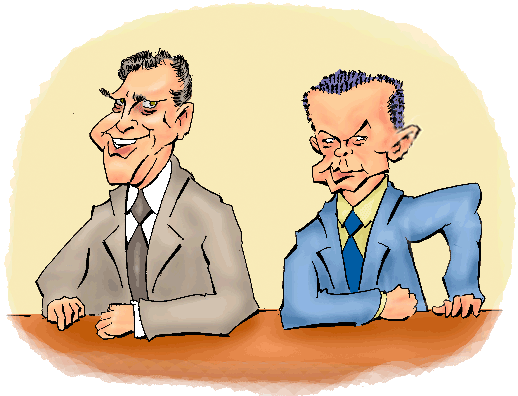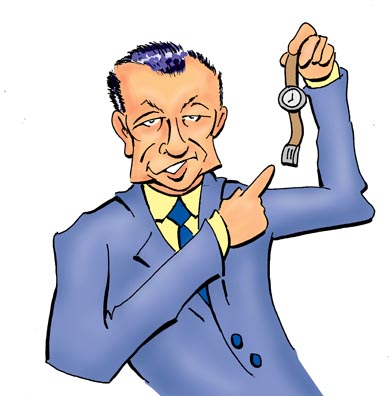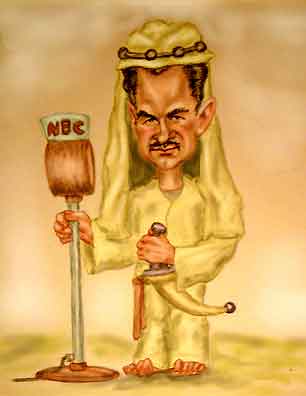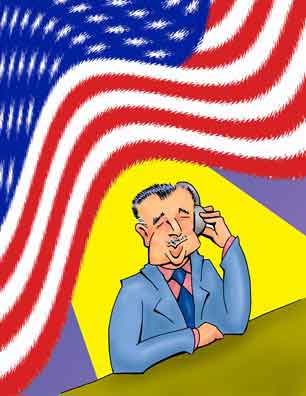Chet and David

Chet and David
Starting in 1956, millions of people tuned in to the Huntley-Brinkley Report for a - get this - whopping 15 minutes of news each night. Then in 1963 the slot expanded to 30 minutes.
Probably the biggest difference between today's newscasters and those in the early days was style of delivery. You'll note that in the first broadcasts, the newscaster would look into the camera, then drop their eyes, then look into the camera, and then drop their eyes again. That, of course, was because the script was read from a paper held in the broadcaster's hands. Attempts at creating the low tech analogue of a teleprompter - now universally used - were not particularly successful as it was simply a roll of paper that was unwound during the broadcast and which as like as not got tangled up. And to put the entire script on large "idiot cards" simply wasn't practical. So to save problems it was easiest just to read from a piece of paper.
The most notable exception to the drop-and-read style was - as the Brits would say - the "presenter" for the Camel News Caravan, John Cameron Swayze. The Camel News Caravan was the immediate precursor to the Huntley-Brinkley Report, and that John had such a pioneering role is surprising to the baby-boomers who remember him as the guy who did the crazy stunt commercials for Timex watches.

John Cameron Swayze
A Fast Study
But, as David later pointed out, you could hand John a script, he'd make a once-through read and then deliver it almost entirely by memory. This ability - to be a "fast study" - was unique enough that John began presenting the news in 1948.
Yes, they had television in 1948. In fact the boob tube had been around since the 1920's. But it wasn't until the late 1930's that there were some stations on the air and sets became available for the consumer. The pictures stunk but that didn't matter since virtually no one had a television set anyway.
Lowell Thomas, who was by then a world famous journalist having broken the story of T. E. Lawrence after World War I, had gone into radio as a news commentator. So it was a natural that NBC would pick him for the first television news program. That was in 1939, and he began a regular television program the following year. But Lowell didn't like being tied down to a studio and soon returned to radio where he could broadcast from any place in the world.

Lowell Thomas
He didn't care for it.
True commercial television really began only in 1947, and things began to kick off the next year. Then kids could watch Howdy Doody and their parents could chuckle with Milton Berle. By 1948, there were actually two networks with news programs. One was CBS's TV News, and the other, as we said, was NBC's Camel News Caravan hosted by John.
David had in fact been one of John's roving reporters and on the old broadcasts we get the first view of the very young - well, early thirties - David Brinkley. And David would fill in for John from time to time as the anchor.
The careful reader may have noted that John's show was called the Camel News Caravan. This was, of course, the day of the sponsored television show and also the day where nearly 50 % of US adults smoked. Today we go into spittle-flinging diatribes when multi-billionaires and their corporate-totalitarianistic world view hijack news organizations or media outlets, but we forget there was a time when the television sponsors dictated what we saw even on - quote - "objective" - unquote - programs. For instance - again as we were told by David - John Cameron Swayze had to have a lit cigarette in an ash tray when he was on the air, that you could never show an ash tray without a cigarette, you never showed a "No Smoking" sign, and with the exception of Winston Churchill, you never showed anyone smoking a cigar.
The days of the sponsors and alternate sponsors have long vanished, and it's easy to forget how in those early days the commercials were actually an integrated part of the show. This was particularly the case for tobacco companies. There was a brand of cigarettes called Oasis which sponsored a variety show and where the guests entered through a door made like the Oasis "O" logo. And even legendary folk-singer Woody Guthrie was (briefly) on a radio show called Pipe Smoking Time sponsored by the Model Tobacco Company. Woody opened the show with one of his more lamentable compositions:
Howdy, friend, well, it's sure good to know you!
Howdy, friend, well, it's sure good to know you!
Load up your pipe and take your life easy,
With Model Tobacco to light up your way!
We're glad to be with you today.
Woody's opening, though, was low keyed compared to the way Camel News Caravan pandered to the sponsor. The show opened with a rectangular montage of Camel cigarette packs and with the announcer happily intoning:
The makers of Camel cigarettes bring the world's latest news events right into you own living room.
Sit back, light up a Camel, and be an eyewitness to the happenings that made history in the last 24 hours.
The Camel News Caravan presents today's news today, produced for Camel Cigarettes by NBC!
Yes, every sentence in the opening narration contained the word of the sponsor at least once.
But think that's bad? Just wait.
When the camera opened to show John at his desk (looking right into the camera) there were two packs of Camels displayed on the left and right edge of his desk. After discussing some of the world news, John then switched to a lighter topic like sports. On one broadcast in 1954, there was a spot on the upcoming World Series between the Cleveland Indians and the New York Giants.
After showing some film of the teams practicing, the camera cut to an interview. Naturally we start with a close-up of an ash tray and a lighted cigarette next to an opened pack of Camels. And when announcer Rex Marshall came on screen with five of the most prominent players from Cleveland, he introduced them as members of the current world champions, adding, "And incidentally I'm also pleased to make mention of the fact that they all smoke Camels, America's champion cigarette."
Rex then turned to pitcher Bob Lemon.
"Bob," Rex said, "how do you feel the night before the big opener?"
Bob, taking a conspicuous puff on his Camel, gave a cough and replied, "I feel great, Rex. The same way I feel about Camels. They taste good and they're mild.
Rex turned to relief pitcher, Early Wynn.
"Early, are you going to live up to your name against the Giants?
"I'm sure going to try, Rex," Early said, speaking his memorized lines without a hitch. "The series is something special. Just like Camels."
Rex then asked pitcher Mike Garcia, "What do you say, Mike?"
"You can't beat Camels," Mike commented, "for mildness and pleasure."
"Just for a switch, here", Rex continued, "let's meet a catcher. I certainly should say the catcher of the Cleveland Indians, Jim Hegan." As Jim took a big drag on his Camel and blew out the smoke, Rex added, "Well, Jim you certainly know how to handle these pitchers."
"With these guys," Jim said, "it's a pleasure. Like smoking Camels."
Finally as the camera cut back to Rex, we saw him standing next to second baseman Bobby Ávila.
"And also", Rex said, "I thought it would be fun to introduce you to the gentleman you saw in that bit of film there, none other than the American League batting champion for 1954, the one and only Bobby Ávila."
"And Bobby", Rex inevitably said, "I see you smoke the one and only Camels, too."
"Sure do, Rex", answered Bobby, "Camels give me more pleasure."
After wishing the guys luck, Rex faced the camera and said, "Fans, why don't you take a tip from what you've just heard? For more pure pleasure, why don't you try Camels yourself? You know, no other cigarette is so rich-tasting, yet so mild as Camels!"
David himself was a smoker and you could see him sometimes with a ciggie at his elbow. Ironically, it was David - as the successor to Camel News Caravan - who in the 1950's gave what was probably the first interview to the leader of an anti-cigarette alliance. David asked the man - who was a doctor - why he was against smoking. Everyone smokes, said David. You see it in movies and the actors look so elegant!
The doctor told David that cigarette smoking causes cancer, emphysema, and heart problems. So how, David asked, do you know all this, but no one else does? The doctor told David people will know about it, and that he and other colleagues have been noticing the higher frequency of these diseases among smokers than non-smokers. David's report on the air was rather sardonic and - to be fair - it was a report that he later said he regretted giving. For what it's worth, David did give up smoking, but two of his brothers did not, and both died of lung cancer.
Like many individuals in successful media partnerships, Chet and David were not personally close friends. Most of this, of course, was simply a factor of circumstance. Chet lived in New York, and David in Washington. But when they got together - professionally at the political conventions or personally when they were in the other's town - they got along fine.

Walter Cronkite
The Most Trusted Man in America
For the first 12 years, the Huntley-Brinkley Report was the #1 news program on the air - even ahead of the most trusted man in America, Walter Cronkite. But then they slipped into the #2 slot. Some have attributed the drop to the strike of the American Federation of Television and Radio Artists (AFTRA) in 1967. Although both men were members - this was the day of the closed shop - Chet crossed the picket lines and appeared on the air. He felt he was a reporter not a performer. But David stayed away. He later said he learned the strike was over a minor and highly localized matter, but on advice of his lawyer he had honored the pickets until the strike was resolved two weeks later. But ascribing Chet and David's drop in ratings to the strike is a bit problematical. Are we supposed to blame Chet for coming to work or David for staying away?
Oddly enough, their soon to be iconic sign off - "Goodnight, Chet", "Goodnight, David" - was something neither man wanted to do. Chet - who was actually a westerner from Montana - thought it was sissified. David just thought it was silly. But Reuven Frank - the producer - knew what he was doing and he insisted and they did. Reuvan, after all, was the boss.
Actually the sign-off included the sponsor's name.
"Goodnight, Chet."
"Goodnight, David ... and goodnight from ...
No, it wasn't Camels, thank goodness. It was Texaco. And as this was the time before oil companies became the big baddies and was when gas sold for 25¢ a gallon, it didn't sound so bad. And at first the show was actually called The Texaco Huntley and Brinkley Report. Then later when it was realized that a sponsored news program created just a wee bit of a conflict of interest, NBC itself became the sponsor. And so when the show finally ended with Chet's departure in 1970, the sign off was:
Goodnight, Chet."
Goodnight, David ... and goodnight from NBC News."
And goodnight from CooperToons.
References
David Brinkley: A Memoir, David Brinkley, Alfred A. Knopf Inc. (1995)
"Huntley-Brinkley Report", Emmy Legends, http://www.emmytvlegends.org/interviews/shows/huntley-brinkley-report-the
Camel News Caravan, September 28, 1954, available on, https://archive.org/details/CamelNewsCaravan-28september1954
"Interview with David Brinkley", Brian Lamb, Book TV, 1995.
"Election Night 1960", John Chancellor (Presenter), A&E.
"History of Television", Grollier's Encyclopedia, http://www.emmytvlegends.org/interviews/shows/huntley-brinkley-report-the